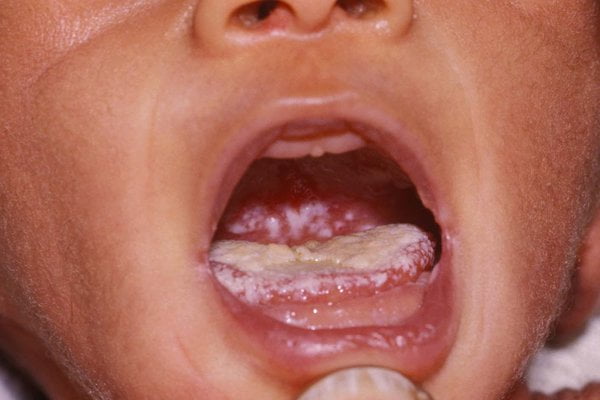Oral candidiasis locally known as ubugendakanwa can result in heart, liver diseases due to traditional medications

An image showing how oral thrush seems like in its patient's mouth.
Oral thrush also known as candidiasis is a fungus infection of the mouth; occurs when a group of yeasts called candida albicans are in the mouth according to the dentist, Dr Bede Bana.
Talking to The New Times, Dr Epimak Kayiranga, a dentist, says oral thrush is common to children and adults too. This disease is treated by doctors where you can get medications, but many villagers are unaware and have myths that the health centers don’t treat it. Dr Kayiranga, says it normally causes white or yellowish bumps to form on the inner cheeks and tongue, and those bumps usually go away with treatment.
Jacqueline Nyirahabimana, a mother of five based in the village, Nyabitekeri sector, Nyamasheke district says that at health centers, hospitals don’t diagnose oral thrush, but traditionally: “At health centers, they don’t treat oral thrush, but in tradition they do. I used to have my child who was attacked by oral thrush, I took him to a traditional healer who treated him by scraping in his mouth by using maize hairs and other plant medicines, and then after the blister blood get out […]”.
Additionally, when she is asked why she didn’t take her child to the hospital or health centers that are nearest to her, announces that her neighbor told her that the hospital doesn’t treat that disease.

If many rural-based people are having a child with oral thrush, take him/her to traditional doctors for scraping it and using different plant medicines (traditional medication) to drink that can cause heart, and liver problems to the children according to health experts.
Talking to Mr. Felecien Girukubonye, an above fifteen experienced health center’s nurse at Muyange Health Centre in the Nyabitekeri sector especially for under 5-year-old children, adults, and the vulnerable says that traditional doctors use unsafe medicines or plants that could cause other diseases: “When we receive and talk to an oral thrush patient, he says that the traditional doctors scrape them by using unreliable medicines that could result in liver’s problems and other diseases because they don’t have medical tools; they heal just for only oral candidiasis, not for having more information about the health. Those scraped or moved bacteria, bad blood from the mouth, some are swallowed and others go out; those that have been swallowed cause problems like diseases in the stomach. At health centers, we absolutely treat oral thrush. Fortunately, if a patient is not well recovered we transfer him to the hospital for further treatment and checking, but traditionally they do not.”
Anthere Havugimana, a 71-year-old, a traditional doctor who treats, and scrapes oral thrush by using maize hairs (and other traditional medications or plants he doesn’t reveal to us) announces that oral candidiasis is the bumps that affect the inner cheeks and the tongue. When oral thrush patients aren’t scrapped (treated) earlier, they become worse for them. He says that he treats almost children in his village and sometimes others from other villages in three days for recovery: “Oral thrush is mouth disease that affects a person on his tongue where there are small lesions, soreness, and whiteness in the mouth. When an oral thrush person is approaching me, I treat him/her by scraping him in the mouth in three days, and he is okay! From my youngness, I treated oral thrush till now. I treat almost children in this region (Nyabitekeri) by using traditional medications”.

Many parents take their children the traditional healers to get traditional medicine that involves scrapping the tongue surface to remove the thrush instead of health centers for proper diagnosis and safe treatment. Traditional medicines have been known to cause infections, heart diseases, and liver problems according to health experts.
Additionally, Girukubonye urges people to first go to the health centers, and Community-health workers locally known as Abajyanama b’ubuzima for any health issues like oral candidiasis than in traditional medications that take them in trouble like death once it is late treated.
In the reference of Rwanda Biomedical Center (RBC), a dental surgeon, recently a University of Rwanda lecturer, Dr Bede Bana works at Legacy Clinics says that oral candidiasis is mainly to children, low immune deficiency persons like HIV/AIDS, smokers, and those who are careless to their dentures: “The children and the persons whose low immune deficiency such as HIV/AIDS who postponed the medicines or those who are not aware that they are HIV victims, are highly in danger even smokers. The children have ongoing growth of the immune deficiency that can take them in the trap of oral thrush.”
Does oral candidiasis vaccinated or contaminated
According to the dental expert, Dr Bana says that it is not vaccinated or contaminated, but it can be prevented through having mouth hygiene perfectly, taking HIV/AIDS medicines, not using mouthwash for more than 14 days, and not smoking.
What does WHO about the fungal disease
Based on the World Health Organisation, in response to the rising of threat invasive fungal disease, realized a list of priority of pathogens on October 2022, and the most dangerous ones may astonish somebody. Dr Justin Beardsley, of the University of Sydney Infectious Diseases Institute in the statement, said: “Fungi are the forgotten infectious disease. They cause devastating but have been neglected so long that we barely understand the size of the problem. Dr Justin was a researcher supporting the WHO Fungal Priority Pathogens List’s development.
In the World Health Organisation African Region in 2019, oral diseases were the most common diseases globally and regionally, affecting an estimated 480 million people equally to 43.7%.
The signs of oral thrush
It has different signs, but some of them are as follows; white patches (plaques) or diaper rash in the mouth that can often be wiped off, leaving behind red areas that may bleed slightly. The oral thrush patient gets loss of appetite taste or an unpleasant taste; that leads to exsanguination (severe loss of blood), redness inside, cracks at the corners of the mouth and throat, and also feels a painful, burning sensation in the mouth.
Furthermore, talking to The New Times, a dentist at the University Teaching Hospital of Kigali (CHUK), Dr Gonzalue Niyigaba, says those who might be prone to oral thrush include people who wear dentures, especially if they are not kept clean, do not fit properly, and/or are not taken out before going to sleep. Also, Dr Niyigaba notes that people on antibiotics have a higher risk of developing oral thrush as antibiotics may destroy the bacteria that prevent candida from growing out of control.
Jeanne Ishimwe (a name withheld for her request) a village resident who always takes her children to the traditional healers says that she does not have an idea that health centers or hospitals treat this mouth disease namely oral thrush: “I always take my children in traditional treatment due to I’m not well informed that at health centers treat and diagnose it. Indeed, I get my neighbors, comrades in the same region in tradition for oral thrush […].”
Besides these, in Rwanda either the city or village have been built hospitals and health centers for shortening the residents’ journey for being safe and healthier. In this regard, the Government of Rwanda set for health volunteers called Community-health workers locally known as Abajyanama b’ubuzima for quick and basic treatments.
Talking to Albertine Mukamana, a mother of three children in the same sector, who took her child to the health center for oral thrush, says that doctors treat this disease and the child gets treated well: “Indeed, at health centers, they treat oral candidiasis; they give you the treatments for the child who is an oral thrush victim […]. I know that many don’t believe it, but I can testify them”.
She adds that many people especially in the village are having different myths about this disease and other diseases that should be left out and follow modern treatments than traditional ones.
It is in the above line that Dr Bede also emphasizes that in the village are more likely to be rushing in the traditional treatments for oral thrush compared to the urban areas: “The urban people are interested to be treated at health centers or hospitals whereas the villagers are likely in the traditional healers for an oral thrush.”
Oral candidiasis complicates people, but much to children and patients with weakened immune systems like HIV/AIDS are likely to be affected easily as experts say.
Health experts’ especially dental surgeons urge that practicing good mouth hygiene is helpful and it can be done by brushing the teeth with a soft toothbrush to avoid scraping the bumps caused by thrush. Replace your toothbrush after you finish your treatment for oral thrush and also for three months for the usage, and properly clean your dentures if you wear them for minimizing the risks. Furthermore, minimize the use of antibiotics where necessary.
Patrick SIBOMANA byline (psibomana98@gmail.com)

